In short, no. SEO isn’t dead in 2025, but it is evolving. At our recent Hookflash event I showcased all of the reasons why it isn’t dead, and why you shouldn’t just take my word for it.
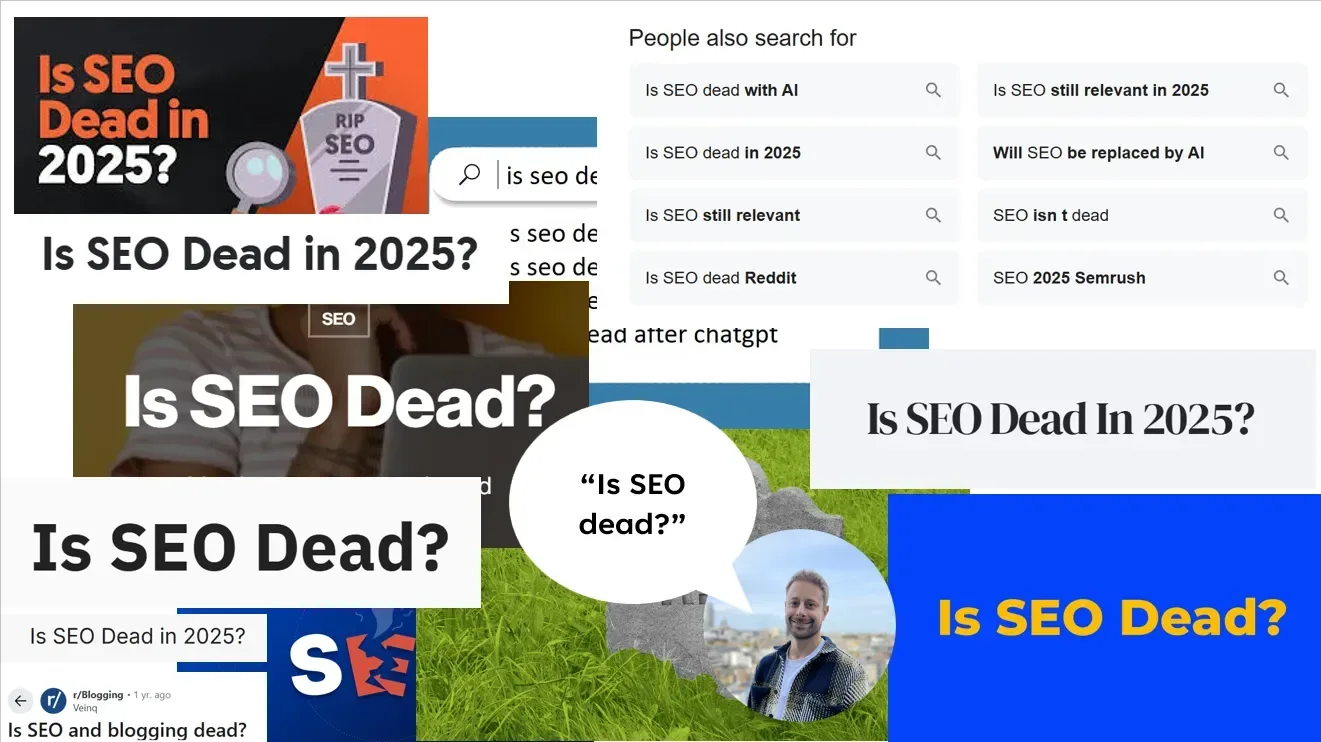
According to the (SEO) nation’s favourite Rand Fishkin on Linkedin , presence across search is what is most important now. We can all agree that it isn’t enough to just be #1 in traditional search; we need to be featured in AI Overviews, cited in LLMs, and also have a presence across socials and news outlets.
Not only that, he notes that while CTRs have been seen to drop, usage of Google has been increasing. LLMs aren’t taking up anywhere near as much as space in search as we might be led to believe.
So, can we relax? Not exactly…
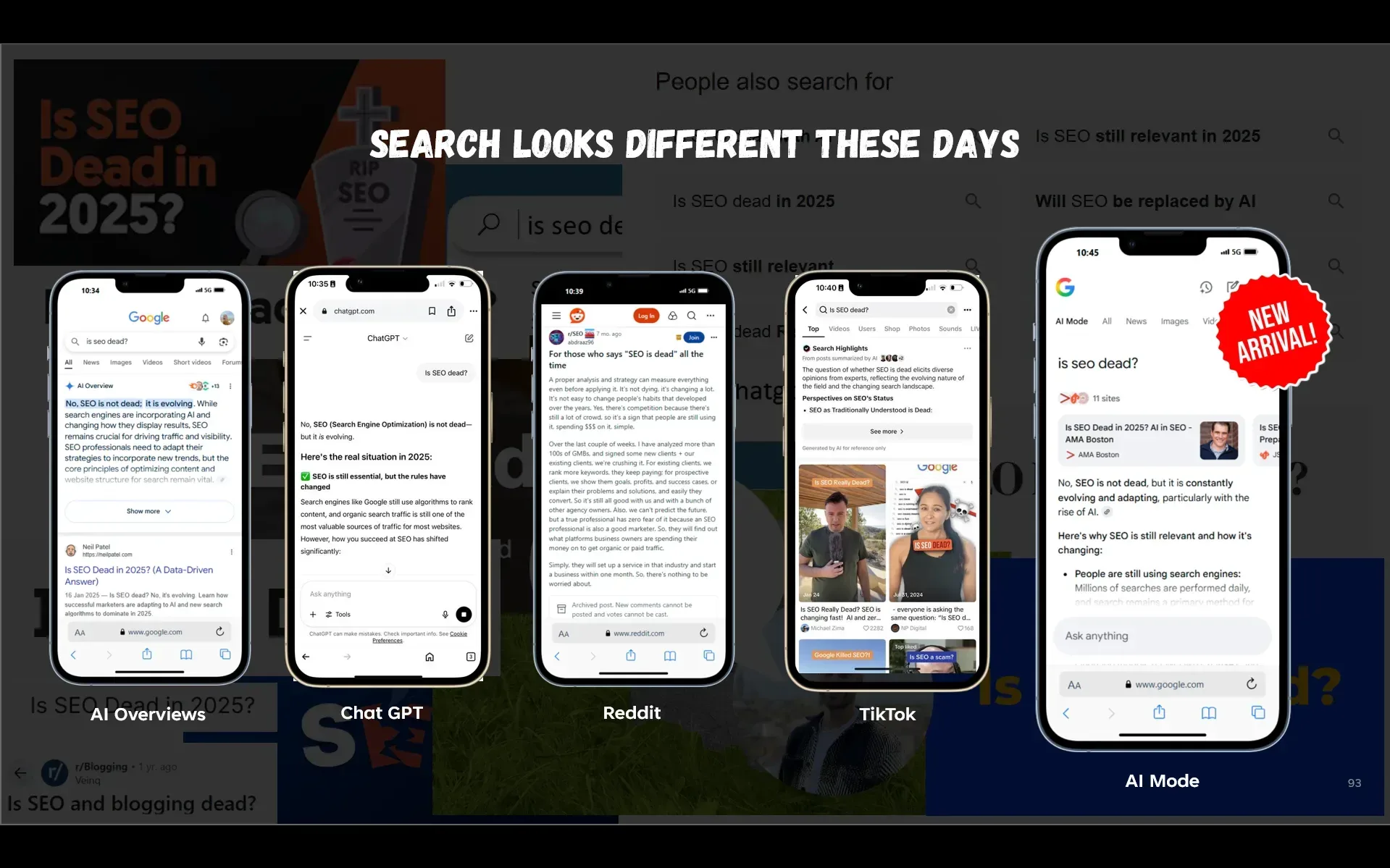
Search looks different these days
We can’t deny that search does look pretty different these days. The above picture shows ‘Is SEO dead?’ across Google (AI Overview result), Chat GPT, Reddit, TikTok, and Google’s latest launch: AI Mode (US-based for now).
Not only is traditional search more competitive with generative AI results, users are undoubtedly turning to LLMs such as chat GPT for detailed answers to complicated questions, as well as to socials for user-generated support and guidance.
SEO is no longer SEO – more, SO – Search Optimisation. I discussed the fact that SEO needs to be considered a brand discipline as well as performance; we are now working to ensure that we are visible across multiple touchpoints in order to increase consideration, not just to improve rankings & clicks.
So what does this mean for SEO?
Foundational SEO is just as important as ever, but we now need to consider leveraging data from more than just Google, as well as reporting on success across platforms. Google themselves have said as much .
Ultimately, generative AI and LLMs have to gather their information from somewhere; so wouldn’t you rather it was your site over your competitors’?
Similarly, if users are increasingly searching across socials, are we leaning in to this? Do we have content on-site that mirrors high performing content on socials? Are we using customer search data to inform our content and vice-versa, are we feeding in to evergreen social content?
If a user wishes to interact with your brand, you still need a website in order to put your best foot forward.
Getting foundational SEO right
We don’t know a huge amount about LLM bots & algorithms right now, but we can probably assume that they are somewhat similar to Google. If not more basic. With that in mind, we need to make it as easy as possible for them to hit your website*.
*Please don’t block them in your robots.txt file unless you have a genuine concern about the information they may pull from your site!
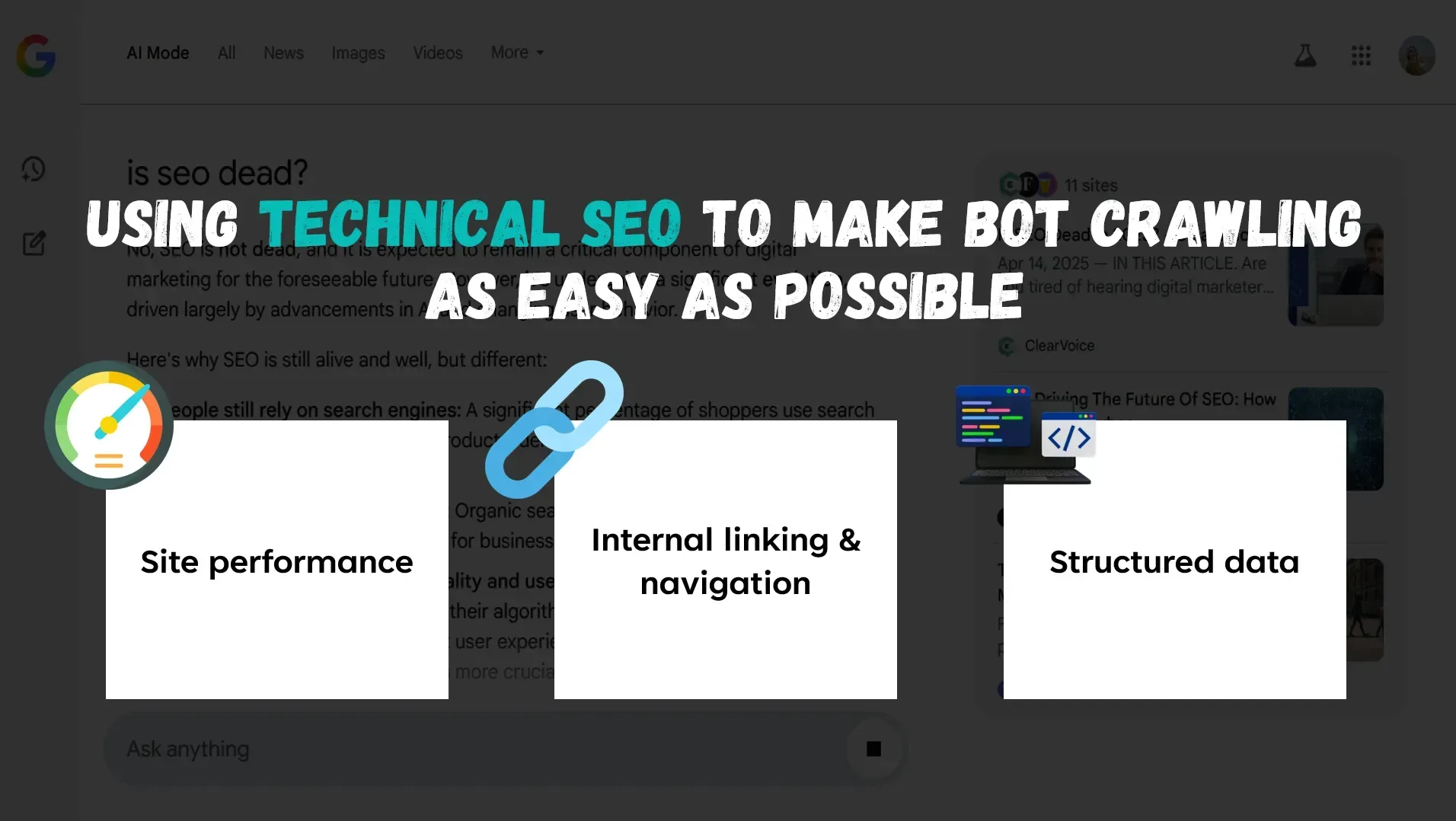
The first step is technical SEO. I pulled out three of the highest priority items when it comes to LLM bot crawling & indexing:
- Site performance – let’s make it as easy as possible for your high priority content to be discovered shall we? Ensure your critical content loads in your HTML, don’t use loads of fancy JavaScript rendering, etc.
- Internal linking & navigation – are you effectively linking to your high priority content? Is your anchor text optimised? Do you have a nice linking ecosystem between landing pages and blogs?
- Structured data – put simply, write your content in a language that the bots understand. Tell them what is on the page, don’t leave it up to them to try and make any decisions themselves.
Without technical SEO foundations in place, what use is helpful content if it can’t be found by the bots?
The second step is then the content itself.
Writing content with LLMs in mind
To summarise my most recent blog on GSO (Generative Search Optimisation) ; we need to be putting high quality content at the forefront of our website optimisations. We know that customers are increasingly likely to ask complex purchasing decision questions in platforms such as Chat GPT, so we need to ensure that we are being cited in those answers.
Reporting on traffic from LLMs to your site
While traffic from LLMs is fairly small at the moment, we should absolutely be keeping track of this traffic to site. Thankfully, we can use referral traffic in GA4 to understand where users are landing from these platforms. Search Engine Land have written up a full explanation on how to do so.
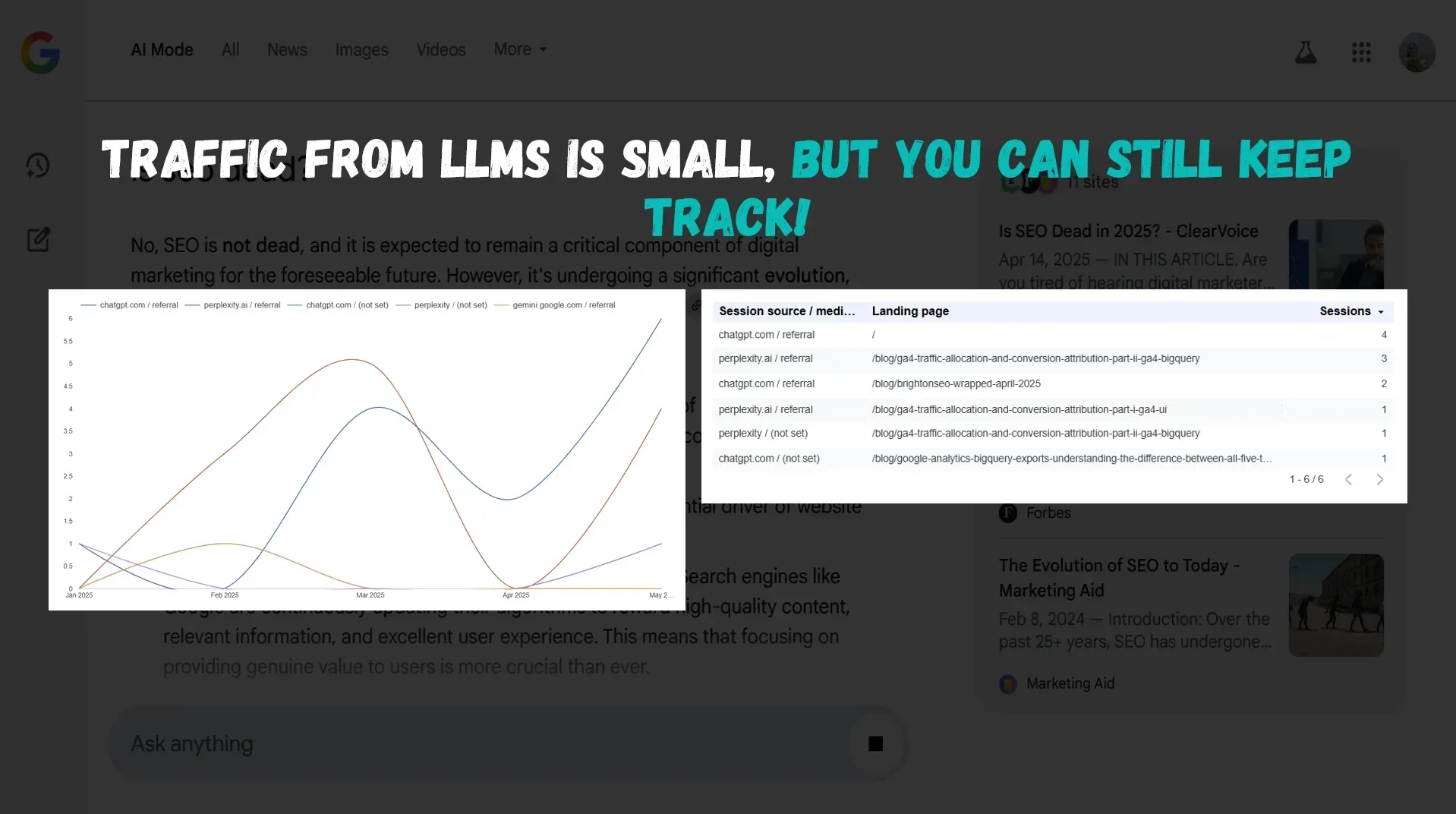
By setting up reports in Looker Studio to monitor this over time, we can understand what % of overall traffic is coming from LLMs, as well as understand where visitors are landing, and what they are doing next on-site. The image above is a very quick mock-up of how you can transform that data for our Hookflash website.
Interestingly, Search Engine Land carried out a study and found that traffic landing on sites via LLMs were less engaged than those who landed via traditional organic search. This may change over time though, especially as more users get used to a conversion journey that starts in these platforms.
With the launch of AI Mode, at present, Google is not sending referrer tracking. Sad times. They have said that this might come soon though, according to John Mueller on LinkedIn.
Optimising for organic brand presence across socials
Despite the rise in usage of generative AI in users, I optimistically believe that as humans, we will continue to favour user generated content (UGC) over AI. Enter: TikTok and Reddit. Looking for restaurant and activity recommendations in a new city? TikTok is your best friend. Trying to troubleshoot something/seek advice? There’s probably already a Reddit thread on that exact topic.
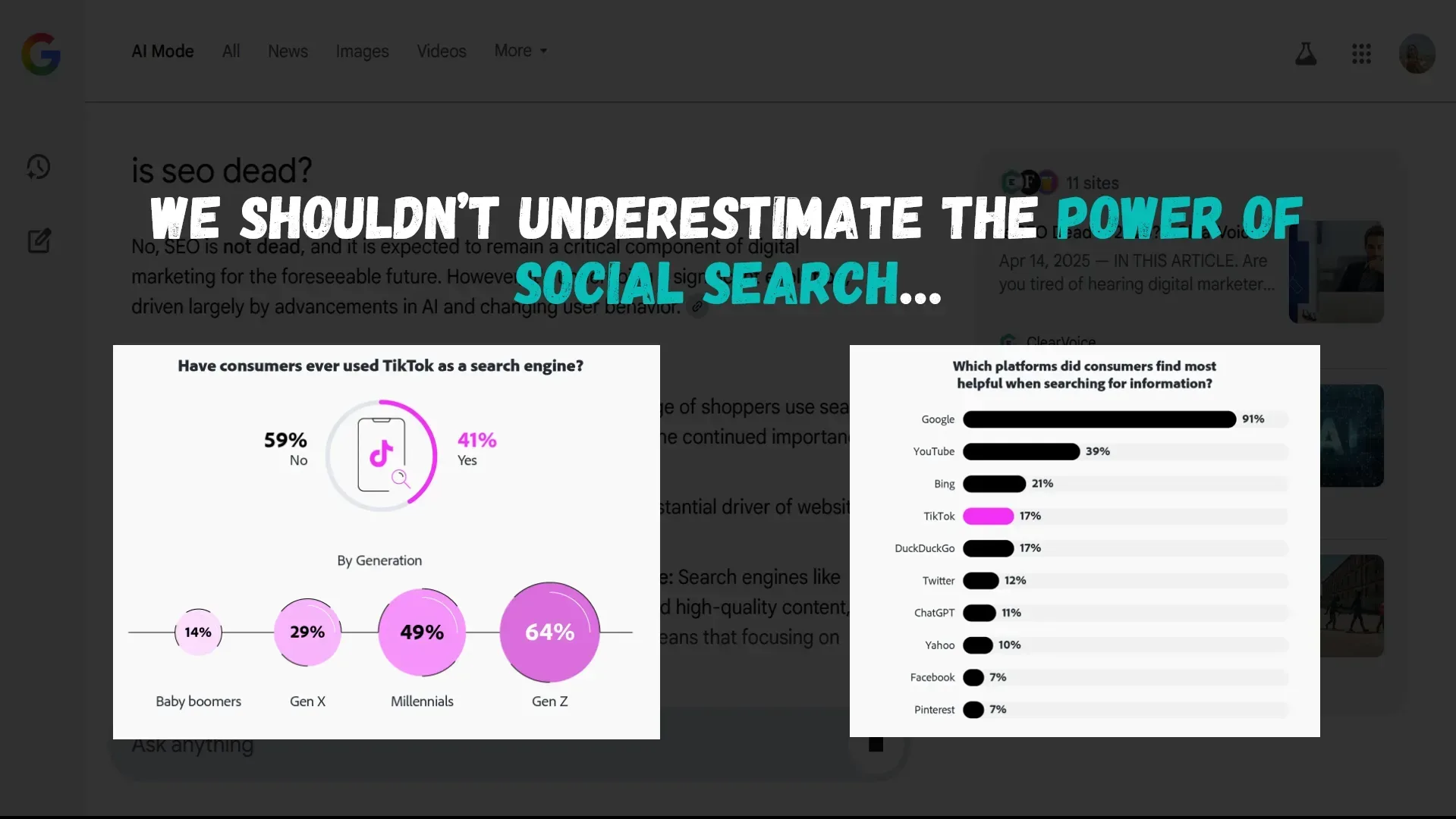
Adobe did a study to understand how customers are searching across the web, including socials. Unsurprisingly, a significant amount (41%) of users asked have used TikTok as a search engine. Not only that, but 17% of all users found TikTok results to be the most useful in answering their questions.
Honourable mention to Bing; TikTok is coming for you!
But why is this relevant for SEO, I hear you ask? This is where the ‘brand’ lens really comes in to play. We shouldn’t look at SEO and Social in siloes anymore, because we need to work together to build that brand awareness and trust across platforms.
Firstly: scraping information from socials for SEO optimisations
In my GSO blog , I briefly mentioned that scraping socials is a great way to create longer-form content based on what you know users are searching for. Reddit in particular is a goldmine for longer-tail queries that are likely going to get asked in LLMs, as well as to your customer care teams. This is a great way for us to understand what content we need to create in order to address concerns/shout about benefits.
At Hookflash we are building a Reddit crawler/scraper that will enable us to pull out user sentiment, comments, upvotes, and more. We will then be injecting that data into our client content briefs so that we can level up the longer-form articles that are being written.
Secondly: using SEO data to inform organic social strategies
Do your social and SEO teams speak to each other? I bet they don’t. I wish they would though.
I will never be so bold as to claim that SEO and reactive social strategies go hand in hand, because they definitely don’t. SEO and evergreen social strategies though? That’s a much more feasible relationship. Social posts that are based on customer search data (again, scraped from socials, PAAs, traditional search, FAQs, careline data) and aid with building brand awareness.
Picture that symmetrical messaging; content across socials, paid media, and website all marrying up? Customers building trust and affinity? Sounds great to me.
Similarly, there is an opportunity for posting and commenting on Reddit. According to Sprout Social , brands can leverage the platform to post, and offer unique perspectives when it feels relevant. My (selfish) concern is that this may feel less genuine than a user-to-user conversation, but that’s probably the way the world is heading.
SEO & the on-site experience
Putting our ‘performance’ hats back on, we mustn’t forget that one of the core goals of SEO is to bring users to a website organically. It would be nice if they also converted while they’re there, too.
Enter, Experimentation (also well known as CRO) . The insights you can get from this team is invaluable. Where are customers dropping off? What are their pain points? What’s working well? Are changes that are being recommended actually going to resonate with customers?
It’s amazing how small changes can make a huge impact on customer conversions & engagement on-site, so where possible we love to bring SEO & CRO together to drive maximum impact for our clients.
Not only that, but we’ve already mentioned site performance as a tool for aiding search engine crawling of the site. Ultimately, though, this is all to benefit your site visitor. It is well known that improvements in site speed also correlate into improvements in conversions too.
SEO isn’t dead, but it is definitely evolving.
You may also be interested in

Step-by-Step Guide: Updating Dataform to Strict act-as Mode
Read more about Step-by-Step Guide: Updating Dataform to Strict act-as Mode
